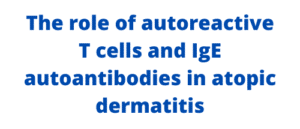Financed by: Fonds Wetenschappelijk Onderzoek (FWO)
Rol in the project: Partner
Project ID: G056322N
Duration: January 2021 to December 2025
Contact: Eguiluz García, Ibon
Implementation centre: Hospital Regional Universitario de Málaga
Research group of IBIMA involved: Drug and Allergen Allergic Diseases

ABSTRACT
In patients with atopic dermatitis (AD), increased risk of co-morbid autoimmune diseases was found. Additionally, IgE-mediated autoimmunity directed to the skin has been demonstrated in patients with moderate/severe AD, suggesting a role for autoreactive IgE antibodies and self-reactive T cells in AD pathophysiology and an association with disease severity. Previously, we measured IgE-autoreactivity in serum samples using a newly established immunoassay. In the present project, we hypothesize that autoreactive IgE antibodies can be present or develop already shortly after birth, and that IgE autoantibodies levels correlate with disease activity. The project aims at investigating the very first stages of IgE-mediated autoimmunity in new-borns in relation to AD-development, heredity and environmental exposure. Next, we aim to explore the effect of systemic treatment on autoreactive IgE antibody levels and to evaluate the relation with disease activity. Finally, we presume that modulation of the PD-1/PD-L1 axis could be a potential target for therapy in these patients. Ultimately, we aim to modulate the PD-1/PD-L1 axis as novel target for therapy in a mouse model. This project will increase current insights of AD-pathophysiology with IgE-mediated autoimmunity and open new doors for disease endotyping and precision therapy with direct consequences for diagnosis and treatment of patients with AD and IgE autoimmunity.
